
Small businesses have had to adapt to survive during this prolonged health crisis, coming up with more creative ways to connect with and serve their customers.
Like many retailers, London tailors Morts & More had to adapt their services when lockdown began.
Delivering personalised consultations for bespoke suits became a lot more difficult under social distancing rules.
“Our business is all about building a connection with people in order to create garments that represent them well,” says co-founder Joshua Umeron.
But rather than doing this in person, they had to move online, combining online conversations with physical fabric samples sent through the post.
Face-to-face consultations went virtual.
“We’ve been able to discuss clients’ needs over the phone, then guide them through our visual design process over Zoom or email, depending on what works best for each person,” says Joshua.

Credits: Morts & More
Morts & More send samples from cloth merchants directly to customers, bringing the physical side of fittings into people’s homes – giving them more confidence in their choices.
With this inventive approach, Morts & More has delivered luxury bespoke tailoring experiences into people’s homes.
“It’s been tricky but we’ve found we’re still able to have meaningful consultations in the current climate,” Joshua concludes.
Reaching new audiences
As well as being more creative about how to interact with customers, companies have also had to be more creative about how they communicate and collaborate internally.
For example, what3words , the global addressing and navigation firm, has been using connectivity to its fullest to keep in touch with its far-flung employees.
“Six-way video conference calls from different continents, bouncing between platforms including Slack and Skype, while all co-editing a Google Doc, has become commonplace,” explains chief marketing officer Giles Rhys Jones.
And the company is also trying to reach new audiences by using popular social media platforms, such as China’s video-based sensation, TikTok.
“TikTok has its own style and allows us to reach a younger audience: kids who are really tech-savvy, and seem to just ‘get’ what3words very instinctively,” says Giles.
“We’re excited to see what new opportunities and types of user TikTok will bring us.”
Creating online communities
A crisis often brings people together, they say. And the same goes for businesses. Lockdown has enforced a kind of trenches camaraderie in many cases.
For example, flowers-through-the-letterbox company Bloom & Wild has created a new business community aimed at sharing best practice, news and views.
“The community was born out of The Thoughtful Marketing Movement we started in March,” explains Head of Brand, Marisa Thomas.

Credits: Bloom & Wild
“We’ve been coming together each month to discuss everything from challenges we face with Covid-19 and how to be there for our customers, through to reflections following Pride month and Black Lives Matter.
“For example, we’re finding ways to better champion BAME and LGBTQ+ communities.”
The physical limitations of lockdown haven’t prevented companies like Bloom & Wild from coming up with ideas on how to improve their businesses and make a positive impact on society. And online connectivity has been key to this inventiveness.
Reliable connectivity
Online collaboration is at the very heart of what Fiverr does, as Brent Messenger, Vice-President, Public Policy & Community Engagement, explains.
“Fiverr is a two-sided marketplace where people connect to collaborate on projects,” he says. “From building websites to producing music, anything that can be delivered digitally can be done on Fiverr.”
Finding new ways to connect people with opportunity goes to the heart of Fiverr’s purpose.
“We create opportunities for anyone to build their business, brand or dreams. But we’re also engaged in advocacy to make sure the path to opportunity is clear as well,” says Brent.
This advocacy extends to fighting to protect access to health insurance for freelancers and entrepreneurs in the US, for example, by defending the Affordable Care Act.
Brent himself recently led a mission to train people in Kibera, Kenya’s largest slum, to become digital freelancers, as part of a UN mission.
Small businesses couldn’t have survived lockdown, or discovered new ways to be creative and collaborative, without reliable connectivity underpinning their efforts.
Find out more about how Vodafone can keep your business connected.









